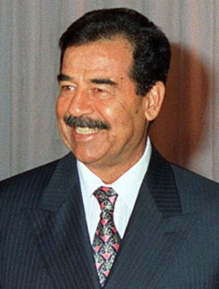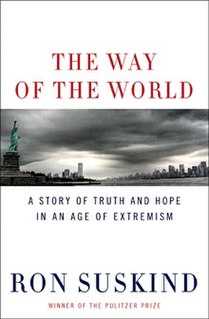
Qusay Saddam Hussein al-Tikriti was an Iraqi politician, military leader, and the second son of Saddam Hussein. He was appointed as his father's heir apparent in 2000. He was also in charge of the Republican Guard.

Saddam Hussein Abd al-Majid al-Tikriti was an Iraqi politician who served as the fifth president of Iraq from 16 July 1979 until 9 April 2003. A leading member of the revolutionary Arab Socialist Ba'ath Party, and later, the Baghdad-based Ba'ath Party and its regional organization, the Iraqi Ba'ath Party—which espoused Ba'athism, a mix of Arab nationalism and Arab socialism—Saddam played a key role in the 1968 coup that brought the party to power in Iraq.

Iraq actively researched and later employed weapons of mass destruction (WMD) from 1962 to 1991, when it destroyed its chemical weapons stockpile and halted its biological and nuclear weapon programs as required by the United Nations Security Council. The fifth President of Iraq, Saddam Hussein, was internationally condemned for his use of chemical weapons during the 1980s campaign against Iranian and Kurdish civilians during and after the Iran–Iraq War. In the 1980s, Saddam pursued an extensive biological weapons program and a nuclear weapons program, though no nuclear bomb was built. After the Persian Gulf War (1990–1991), the United Nations located and destroyed large quantities of Iraqi chemical weapons and related equipment and materials; Iraq ceased its chemical, biological and nuclear programs.

This article describes the positions of world governments before the actual initiation of the 2003 invasion of Iraq, and not their current positions as they may have changed since then.
The 2003 invasion of Iraq began on March 20. On March 18, US President George W. Bush had set a deadline for the ruler of Iraq, Saddam Hussein, and his two sons, Uday and Qusay, to leave the country or face military action. By the time of the ultimatum, political and military preparations for the invasion were well advanced.

The 2003 invasion of Iraq was the first stage of the Iraq War. The invasion phase began on 19 March 2003 (air) and 20 March 2003 (ground) and lasted just over one month, including 26 days of major combat operations, in which a combined force of troops from the United States, the United Kingdom, Australia and Poland invaded Iraq. This early stage of the war formally ended on 1 May 2003 when U.S. President George W. Bush declared the "end of major combat operations", after which the Coalition Provisional Authority (CPA) was established as the first of several successive transitional governments leading up to the first Iraqi parliamentary election in January 2005. U.S. military forces later remained in Iraq until the withdrawal in 2011.

Richard Norman Perle is an American political advisor who served as the Assistant Secretary of Defense for Global Strategic Affairs under President Ronald Reagan. He began his political career as a senior staff member to Senator Henry "Scoop" Jackson on the Senate Armed Services Committee in the 1970s. He served on the Defense Policy Board Advisory Committee from 1987 to 2004 where he served as chairman from 2001 to 2003 under the Bush Administration before resigning due to conflict of interests.

Yevgeny Maksimovich Primakov was a Russian politician and diplomat who served as Prime Minister of Russia from 1998 to 1999. During his long career, he also served as Foreign Minister, Speaker of the Supreme Soviet of the Soviet Union, and chief of the intelligence service. Primakov was an academician (Arabist) and a member of the Presidium of the Russian Academy of Sciences.
The Niger uranium forgeries were forged documents initially released in 2001 by SISMI, which seem to depict an attempt made by Saddam Hussein in Iraq to purchase yellowcake uranium powder from Niger during the Iraq disarmament crisis. On the basis of these documents and other indicators, the governments of the United States and the United Kingdom asserted that Iraq violated United Nations sanctions against Iraq by attempting to procure nuclear material for the purpose of creating weapons of mass destruction.
The following lists events in the year 2003 in Iraq.
Saddam Hussein and al-Qaeda link allegations were made by the U.S. government officials who claimed that a highly secretive relationship existed between Iraqi President Saddam Hussein and the radical Islamist militant organization Al-Qaeda between 1992 and 2003, specifically through a series of meetings reportedly involving the Iraqi Intelligence Service (IIS). In the lead up to the Iraq War, George W. Bush administration officials alleged that the Saddam Hussein regime had an operational relationship with al-Qaeda, basing the administration's rationale for war, in part, on this allegation and others.

The rationale for the Iraq War, both the 2003 invasion of Iraq and the subsequent hostilities, was controversial because the George W. Bush administration began actively pressing for military intervention in Iraq in late 2001. The primary rationalization for the Iraq War was articulated by a joint resolution of the United States Congress known as the Iraq Resolution.
David Wurmser is an American foreign policy specialist. He served as Middle East Adviser to former US Vice President Dick Cheney, as special assistant to John R. Bolton at the State Department and as a research fellow on the Middle East at the American Enterprise Institute (AEI). He served in the U.S. Navy Reserve as an intelligence officer at the rank of Lieutenant Commander.

WMD conjecture in the aftermath of the 2003 invasion of Iraq concerns the immediate reactions and consequences to the failure by the United Nations Monitoring, Verification and Inspection Commission (UNMOVIC) and the U.S.-led Iraq Survey Group (ISG) to find the alleged stockpiles of weapons of mass destruction during and after 2003 invasion of Iraq. The United States effectively terminated the search effort for unconventional weaponry in January 2005, and the Iraq Intelligence Commission concluded that the judgements of the U.S. intelligence community about the continued existence of weapons of mass destruction and an associated military program were wrong. The official findings by the CIA in October 2004 were that Iraqi leader Saddam Hussein "did not possess stockpiles of illicit weapons at the time of the U.S. invasion in March 2003 and had not begun any program to produce them."
A Clean Break: A New Strategy for Securing the Realm is a policy document that was prepared in 1996 by a study group led by Richard Perle for Benjamin Netanyahu, the then Prime Minister of Israel. The report explained a new approach to solving Israel's security problems in the Middle East with an emphasis on "Western values." It has since been criticized for advocating an aggressive new policy including the removal of Saddam Hussein from power in Iraq and the containment of Syria by engaging in proxy warfare and highlighting its possession of "weapons of mass destruction". Certain parts of the policies set forth in the paper were rejected by Netanyahu.
Khidir Hamza is an Iraqi atomic scientist who worked for Saddam Hussein's nuclear programme in the 1980s and early 1990s. Following the Gulf War, he left Iraq in 1994 and went into exile in the United States. He provided testimony to Western intelligence agencies suggesting that Hussein's weapons of mass destruction programmes were active and ongoing. However, since the 2003 invasion of Iraq, most, if not all of his information on the Nuclear Weapons program have been widely discredited, and former UNSCOM inspectors insist that he was never part of the Nuclear Program at all.

The Bush–Aznar memo is reportedly a documentation of a February 22, 2003 conversation in Crawford, Texas between US president George W. Bush, Prime Minister of Spain José María Aznar, National Security Advisor Condoleezza Rice, Daniel Fried, Alberto Carnero, and Javier Rupérez, the Spanish ambassador to the U.S. British Prime Minister Tony Blair and Italian Prime Minister Berlusconi participated by telephone. Rupérez transcribed the meeting's details which El País, a Madrid daily newspaper, published on September 26, 2007. The conversation focuses on the efforts of the US, UK, and Spain to get a second resolution passed by the United Nations Security Council. This "second resolution" would have followed Resolution 1441. Supporters of the resolution also referred to it as the "eighteenth resolution" in reference to the 17 UN resolutions that Iraq had failed to comply with.

The Way of the World: A Story of Truth and Hope in an Age of Extremism is a 2008 non-fiction book by Ron Suskind, claiming various actions and policies of the George W. Bush administration. Most notably, it alleges that the Bush administration ordered the forgery of the Habbush letter to implicate Iraq as having ties to al Qaeda and the hijackers in the September 11 attacks. All these claims have been strenuously denied by the White House and all parties involved. The book, published on August 5, 2008, by Harper, met mixed reviews but received considerable media attention and created controversy.

The Interrogation of Saddam Hussein began shortly after his December 2003 capture, while the deposed President of Iraq was held at the United States Camp Cropper detention facility at Baghdad International Airport. Beginning in February 2004, the interrogation program, codenamed Operation Desert Spider, was controlled by Federal Bureau of Investigation (FBI) agents. Standard FBI FD-302 forms filed at the time were declassified and released in 2009 under a U.S. Freedom of Information Act request filed by the National Security Archive. Saddam, identified as "High Value Detainee #1" in the documents, was the subject of 20 "formal interviews" followed by five "casual conversations." Questioning covered the span of Saddam's political career, from 2003 when he was found hiding in a "spider hole" on a farm near his home town of Tikrit, back to his role in a failed 1959 coup attempt in Iraq, after which he had taken refuge in the very same place, one report noted.











